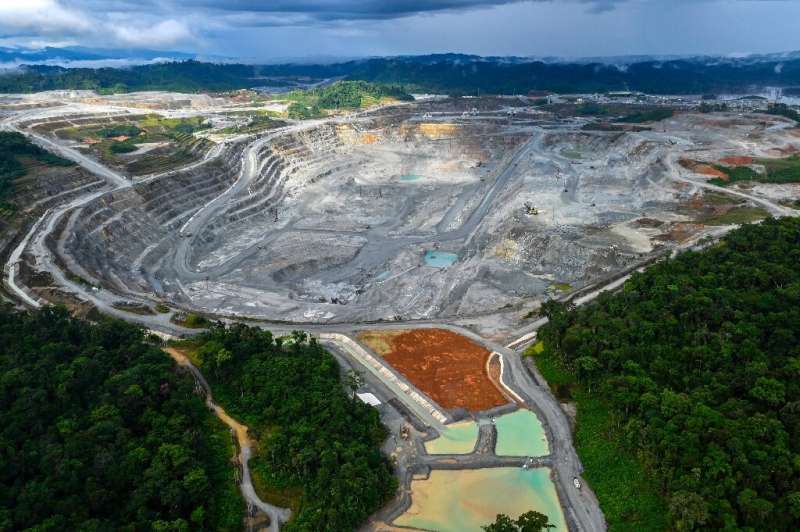Panama eyes export of First Quantum’s stockpiled copper

Panama’s finance chief sees no good reason why First Quantum Minerals Ltd. shouldn’t export the large volume of copper stockpiled at its shuttered mine in the country.
The government is working with a third party on an environmental assessment to quantify the amount of copper concentrate stored at the mine and determine when it was extracted, Finance Minister Felipe Chapman said Friday.
“The copper cannot lie sitting there forever. It has to be taken out, and if you are going to take it out, you might as well export it,” Chapman said in an interview in Bloomberg’s New York headquarters. “We have to complete the due diligence before making a decision.”
Even Panama’s most radical environmentalists haven’t argued against exporting the copper that has already been mined, he added.
The mine has been sitting idle in the jungle for nearly a year after the Supreme Court ruled last year the company’s operating contract was unconstitutional. It’s closure hit economic growth and government revenue, led Fitch Ratings to cut the nation’s credit rating to junk.
The mine had accounted for about 1.5% of global copper production and about 4% of Panama’s gross domestic product. The firm has filed an arbitration suit against Panama.
Panama’s government is focused on approving a social security reform before this year ends, and will discuss the mine’s future next year, Chapman said. He said First Quantum must withdraw its arbitration suit before talks can begin between the firm and the administration of President Jose Raul Mulino, who took office in July.
“We are more than willing to sit down and talk with them as long as they drop their intentions of suing the government,” Chapman said. “That’s our pre-condition.”
Writing on the wall
Chapman, a former business consultant, advised the mine when First Quantum was negotiating a revised operating contract under the previous government. The revised contract granted First Quantum an extension to operate the mine for up to 40 years, a tax payment of at least $375 million and a royalty rate of between 12-16% depending on operating margins.
He said he warned the company that the revised contract was likely to fail because it didn’t include enough revenue for the government, among other reasons.
“It was written on the wall, a huge wall, and they just ignored it,” he said.
The mine was shuttered following months of violent protests that blocked Panama’s main roads and highways.
Chapman said sentiment has changed in the past two months as the government seeks to regain public trust. He said the government is studying alternatives such as opening the mine for a shorter time frame, improving environmental oversight and regulation of the mine and re-reading public sentiment, which will help guide decisions next year.
“You have political capital to use it,” Chapman said. “The current level of political capital is very high, and it will be used in the interest of the people of Panama.”
Ugly outlook
The government is striving to prevent further downgrades to its credit rating in the short term, and improve on it over the medium-term, Chapman said.
“This year, it’s going to look ugly in fiscal terms. That’s anticipated by everyone, including us,” he said. “Next year is going to be quite different.”
The government is targeting a fiscal deficit of 3% to 3.5% of gross domestic product for 2025. This year, the government had originally targeted 4%, but now accepts it’s going to be higher than that, he said.
Short term measures to rein in the deficit include an “expense freeze”, he said. He said that he sees himself as a “bad cop”, and the complaints he receives reassure him that he’s doing his job.
The country plans to narrow the deficit in such as a way as to have a “soft landing”, he said.
“Panama is not in a financial crisis, we don’t need shock therapy,” he said.
The nation’s bonds sold off last year after the government moved to shut the mine. In the aftermath of the closure, Fitch cut the the country to junk. Investors then feared a second cut by Moody’s Ratings or S&P Global Ratings — which would lead to the loss of the nation’s investment-grade status.
The second downgrade has yet to happen. The debt is already being treated as junk by investors, however, who demand a premium to hold Panama’s bonds over those of similarly-rated nations.
The economy will expand 2.5% this year, accelerating to 4% in 2025, according to the ministry’s forecasts. Without the mine’s closure, this year’s expansion would have been two percentage points higher, he said.
(By Michael McDonald and Vinícius Andrade)
{{ commodity.name }}
{{ post.title }}
{{ post.date }}




Comments